Podcast: Play in new window | Download (Duration: 27:28 — 19.0MB) | Embed
Subscribe: Apple Podcasts | Spotify | Amazon Music | Android | Pandora | iHeartRadio | JioSaavn | Podchaser | Gaana | Podcast Index | Email | TuneIn | Deezer | Anghami | RSS | More

Episode 2 – Navigating Life, Death, and Ethical Dilemmas – The Final Journey with Dr. Stephen Doran, M.D.
In this podcast episode, Dr. Stephen Doran and Kris McGregor discuss the nature of death from both medical and spiritual viewpoints. Dr. Doran, a neurosurgeon and deacon, defines death clinically as the cessation of bodily functions but emphasizes its more profound significance in Catholicism as the soul’s separation from the body. He discusses the challenges in medical practice, especially around end-of-life decisions, highlighting the importance of aligning with God’s will and providing unbiased information to families.
The conversation also explores Dr. Doran’s journey to becoming a deacon and how it has enriched his medical practice. Ethical and moral considerations in medicine, particularly in the context of brain death and technological advancements, are addressed. Dr. Doran underscores the need for decision-making principles grounded in science and faith.
The episode touches on issues like euthanasia and assisted suicide, noting their impact on medical ethics and practice. Dr. Doran concludes by encouraging healthcare professionals to integrate love and faith into their work and personal lives, reinforcing the central role of love in all aspects of life.
For more episodes in the series, visit The Final Journey: Insights from a Catholic Doctor and Neurosurgeon w/ Dr. Stephen Doran M.D. – Discerning Hearts Podcasts.
Stephen Doran, M.D., a board-certified neurosurgeon with over twenty-five years of experience, is an ordained permanent deacon and serves as the bioethicist for the Archdiocese of Omaha. His writings in bioethics, neurosurgery, and gene therapy for brain disorders have been widely published in national media outlets, academic journals, and neurosurgery textbooks. He is married with five sons. He co-founded Seeking Truth Catholic Bible Study with his wife, Sharon.
Discerning Hearts reflection questions for this episode:
- Understanding Death’s Conundrum: How does the conversation highlight the challenges people face in understanding and making decisions about death in today’s complex world of medical advancements?
- Letting Go and Conforming to God’s Will: In what ways does the podcast discuss the significance of letting go and conforming one’s will to God, especially in the context of dealing with end-of-life decisions?
- Integration of Faith in Medical Practice: How does Dr. Stephen Doran reflect on the integration of his faith into his role as a neurosurgeon and deacon, and why is it essential for clinicians to be more than just doctors who happen to be Catholic?
- The Role of Physicians in Providing Information: What is emphasized regarding the role of physicians, particularly in situations where decisions about withholding nutrition, palliative care, or hospice care need to be addressed? How does Dr. Doran approach providing information to families facing these decisions?
- Challenges of Evolving Technology: How does the podcast address the challenges posed by advancing medical technology, especially in areas like determining brain death, and how do these challenges intersect with ethical, moral, and faith-based considerations?
- The Witness of Dying Well: How does the conversation highlight the importance of dying well as a witness to the community, and what impact can a person’s approach to death have on those witnessing it, regardless of their faith background?
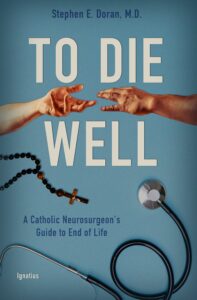
You can find the book here
From the book description:
Dr. Stephen Doran draws from his vast experience as a neurosurgeon, a bioethicist, and a permanent deacon to present the Catholic perspective on the art of dying well. The spiritual and moral issues related to death and the process of dying can be challenging and complicated. To Die Well provides a detailed yet readily understandable guide to these topics.
Each chapter begins with a story from Dr. Doran’s personal or professional life that not only provides context for the topic at hand but also gently draws the reader toward the personal realities of dying. The first part focuses on the moral issues that surround death and dying, including end-of-life medical decisions. The second part is devoted to the Catholic spiritual understanding of dying and the rites that accompany the death of a Catholic.
To Die Well will help readers contemplate, pray about, and prepare for the end of their earthly lives.


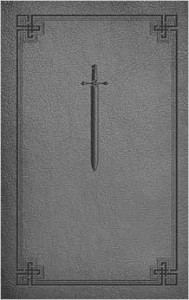
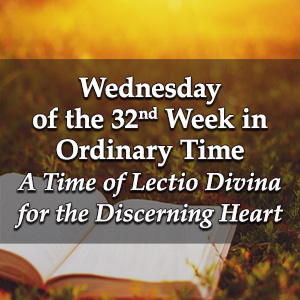 Wednesday of the Thirty-Second Week in Ordinary Time – A Time of Lectio Divina for the Discerning Heart Podcast
Wednesday of the Thirty-Second Week in Ordinary Time – A Time of Lectio Divina for the Discerning Heart Podcast


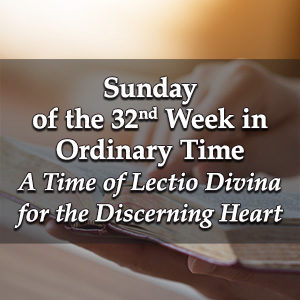 Sunday of the Thirty-Second Week in Ordinary Time – A Time of Lectio Divina for the Discerning Heart Podcast
Sunday of the Thirty-Second Week in Ordinary Time – A Time of Lectio Divina for the Discerning Heart Podcast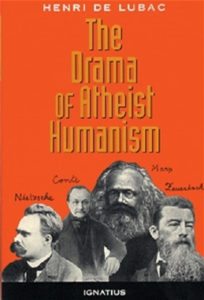 You can find the book
You can find the book 



 Aware of the historical period in which he lived and of the change that was taking place – from pagan Rome to Christian Rome – in a period of profound crisis, Leo the Great knew how to make himself close to the people and the faithful with his pastoral action and his preaching. He enlivened charity in a Rome tried by famines, an influx of refugees, injustice and poverty. He opposed pagan superstitions and the actions of Manichaean groups. He associated the liturgy with the daily life of Christians: for example, by combining the practice of fasting with charity and almsgiving above all on the occasion of the Quattro tempora, which in the course of the year marked the change of seasons. In particular, Leo the Great taught his faithful – and his words still apply for us today – that the Christian liturgy is not the memory of past events, but the actualization of invisible realities which act in the lives of each one of us. This is what he stressed in a sermon (cf. 64, 1-2) on Easter, to be celebrated in every season of the year “not so much as something of the past as rather an event of the present”. All this fits into a precise project, the Holy Pontiff insisted: just as, in fact, the Creator enlivened with the breath of rational life man formed from the dust of the ground, after the original sin he sent his Son into the world to restore to man his lost dignity and to destroy the dominion of the devil through the new life of grace.
Aware of the historical period in which he lived and of the change that was taking place – from pagan Rome to Christian Rome – in a period of profound crisis, Leo the Great knew how to make himself close to the people and the faithful with his pastoral action and his preaching. He enlivened charity in a Rome tried by famines, an influx of refugees, injustice and poverty. He opposed pagan superstitions and the actions of Manichaean groups. He associated the liturgy with the daily life of Christians: for example, by combining the practice of fasting with charity and almsgiving above all on the occasion of the Quattro tempora, which in the course of the year marked the change of seasons. In particular, Leo the Great taught his faithful – and his words still apply for us today – that the Christian liturgy is not the memory of past events, but the actualization of invisible realities which act in the lives of each one of us. This is what he stressed in a sermon (cf. 64, 1-2) on Easter, to be celebrated in every season of the year “not so much as something of the past as rather an event of the present”. All this fits into a precise project, the Holy Pontiff insisted: just as, in fact, the Creator enlivened with the breath of rational life man formed from the dust of the ground, after the original sin he sent his Son into the world to restore to man his lost dignity and to destroy the dominion of the devil through the new life of grace.